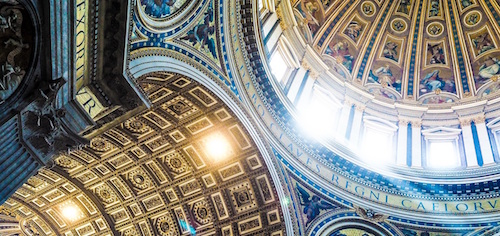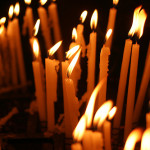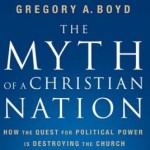We run our website the way we wished the whole internet worked: we provide high quality original content with no ads. We are funded solely by your direct support. Please consider supporting this project.

The Problem with “Church”
Many people think of church as a religious building people attend once a week to sing, hear a sermon, take an offering and perhaps participate in the Lord’s Supper (or “take Communion”). Many refer to the church as “the house of the Lord,” imagining that God is more present in this sacred building and during church services than at other places and times.
As common as such conceptions are, it’s important to note that Christians never dreamed of associating church with a building until the fourth century. Here’s the very short version of what happened.
In 312 A.D. a pagan emperor named Constantine converted to Christianity because, on the basis of a vision he allegedly received, he believed Jesus helped him win an important battle. Constantine immediately legalized Christianity and, with the fear of persecution gone and the emperor’s new stamp of approval on it, Christianity became popular overnight. In the following decades, Christians acquired more and more political power and in 381 A.D. Christianity became the official religion of the Roman Empire. This made it illegal not to be a Christian (though Jews were officially exempt from this law).
You might imagine that the increased popularity of Christianity and increased political power would have been a positive thing. It was, if your criteria of success is popularity and political power. But if your criteria is instead looking and loving like Jesus, as it must be for Kingdom people, then the changes brought on by Constantine must be deemed catastrophic. No sooner did Christians gain political power than they began persecuting and even putting to death non-Christians. While there has always been a stream of Jesus-looking Kingdom people throughout history, the “church” after this time more often than not looked like a religious version of Caesar than the humble, servant Jesus.
Another consequence of the immediate popularity of Christianity after Constantine’s alleged conversion was that masses of pagans came into the church and began to influence it in a pagan direction.
For example, Christians before the time of Constantine didn’t go to church: they rather understood that they were called to be the church. The Greek word for church (ecclesia) means “called out ones,” so the word “church” in the New Testament refers to the body of people who have been called out of the world by virtue of their faith in Christ. This understanding of church changed rapidly and dramatically after Constantine.
Since pagan gods had temples dedicated to them, Constantine and many of the pagans that started flooding into the church felt Christ should have temples dedicated to him. So, beginning in the early fourth century, Christians began constructing separate religious buildings for Christians to gather in, worship and receive instruction.
Along these same lines, prior to Constantine all Jesus followers understood that they had direct access to God through Christ in the power of the Spirit (Eph. 2:18). People recognized some had God-given gifts to lead others, but no one was thought to be “closer to God” than any others. Instead, everyone had an important gift to offer and role to play within the body of Christ (e.g. 1 Cor. 12-14). There were no passive pew-sitters.
After Constantine, however, Christians began to imitate pagan religions by creating a class of specially trained professionals who were identified as “priests” or “reverends” (literally, revered ones). These people were viewed as holier than others and their job was to mediate God’s presence, power and will to others, just as pagan priests had always done. Over time it was determined that these professionals were the only ones who could serve communion and baptize people. In fact, the ministry, which the NT calls all Christians to, shifted to become the ministry of the religious professionals. The only job of the “lay people” was to attend church, learn from the professionals and give financial support to them. Now the vast majority of the church had become pew-sitters.
This identification of the church with a religious building and the creation of a special class of religious professionals had a profoundly negative effect on the Kingdom, which still impacts us today. If the church is to be the body and bride of Christ God calls us and empowers us to be, we need to rethink what the church is and what we are called to be. As Bonhoeffer once wrote:
The Church is nothing but a section of humanity in which Christ has really taken form. … She has essentially nothing whatever to do with the so-called religious function of man. … What matters in the Church is not religion but the form of Christ, and its taking form amidst a band of men (and women).
What does this mean for us? We will explore this over the next few posts.
Photo credit: Jan Tielens
Category: General
Tags: Church, Constantine, Politics, Power
Topics: The Church
Related Reading

Election Day Communion Resources
Rachel Held Evans posted today about Election Day Communion and provided resources for those of you who cannot attend one of these services. Let’s all be praying today for unity among the saints and blessings of peace regardless of the outcome of this election.

The Purpose of the Church
Concerning the preaching of the Gospel, Paul wrote that God’s intent was that “through the church the wisdom of God in its rich variety might now be made known to the rulers and authorities in the heavenly places … in accordance with the eternal purpose that he has carried out in Christ Jesus our Lord”…

The myth clouds our vision of God’s distinctly beautiful kingdom… [Quotes]
“Instead of living out the radically countercultural mandate of the kingdom of God, this myth has inclined us to Christianize many pagan aspects of our culture. Instead of providing the culture with a radically alternative way of life, we largely present it with a religious version of what it already is. The myth clouds our vision of God’s distinctly beautiful kingdom and thereby undermines our motivation to live as set-apart (holy) disciples of this kingdom.”

Signs of Hope
https://youtu.be/nl78l20AGP0 Greg taped this video for the Nomad podcast series called Signs of Hope. He discusses the hope he finds in the death of Christendom, and the rise in the beautiful new, peace-loving, non-violent, Jesus-centered, global movement.

Do Not Fear
We interrupt this election season to bring you the following reminder: [F]ear is a diabolic force. Its ultimate creator is Satan, and he uses it to keep us in bondage (Heb. 2:15). Throughout history, leaders have used fear to rally the masses around their causes, sometimes getting them to do things they otherwise would never…

Podcast: What if I Don’t Like Church?
Greg and Dan talk about what to do when we do not like church. http://traffic.libsyn.com/askgregboyd/Episode_0450b.mp3
